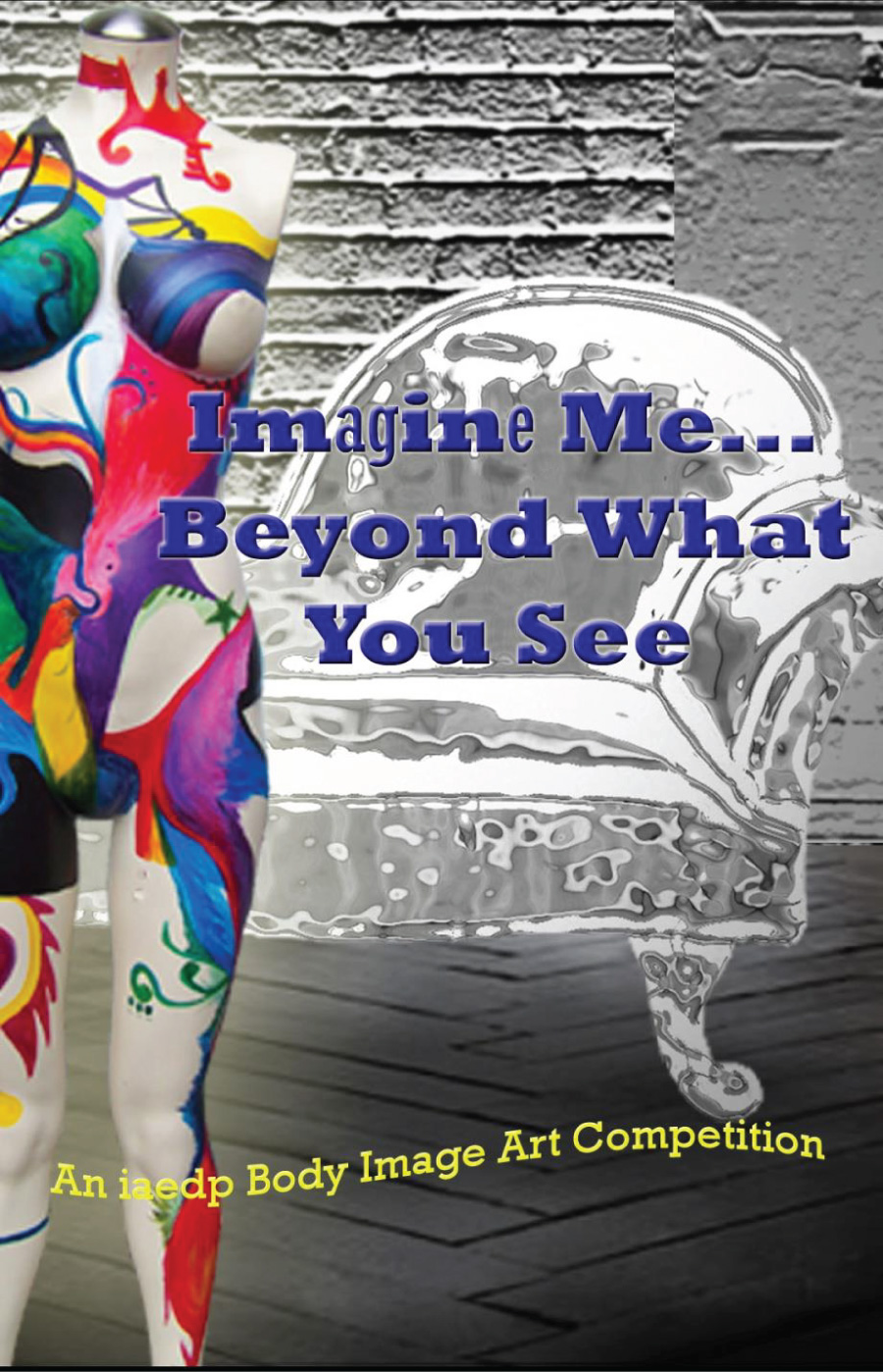ImagineMe Mannequin Contest 2016
Created in 2010, this mannequin art competition is designed to promote healthy awareness and acceptance of body image. iaedp invites national art therapists from treatment centers and private practice, students and the public to artistically create mannequins that reflect their perception of beauty and body image.
Judging Criteria
Mannequin entries are judged on clarity of theme, creativity and originality, quality of composition and design, and the overall impression and presentation of the artwork. The contest is open to everyone; however, iaedp encourages treatment centers and private practices with art therapists to work with patients to provide entries.
Each year, poster images of the mannequin entries are displayed gallery-style at iaedp’s Annual Symposium. The Winner, Runner-Up, Honorable Mention and Professional’s Choice are awarded during a special ceremony. The winner receives a financial award along with the image of their mannequin being used in Imagine Me Beyond What You See™ promotions throughout the coming year. For the awards ceremony, the winning mannequin is shipped to the Annual Symposium, unveiled along with the artist(s) and later auctioned off with proceeds to benefit the iaedp Foundation.
Light
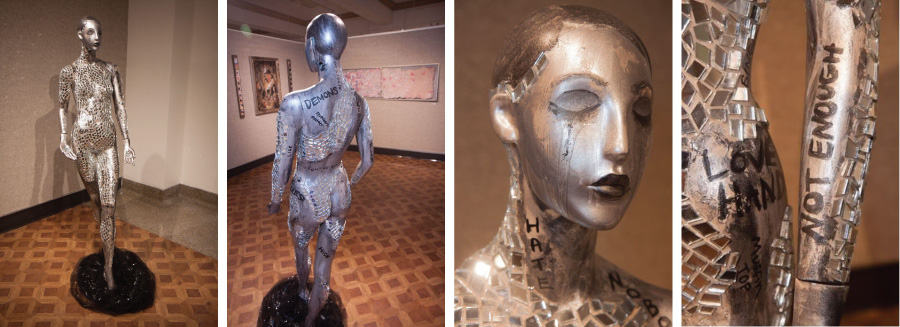
Artist: Rogers Memorial Hospital – Oconomowoc, WI
This piece is an exploration of arts based research on a form of body tracing young women completed in residential treatment. On half of a large sheet of paper, residents were instructed to represent visually and life sized, what they honestly see and feel when looking in the mirror. Many times this perception was distorted and much larger than their actual figure. Once this portrayal of the self was complete, it was juxtaposed next to an accurate rendering of their body traced by the art therapist. Adamant disbelief, shock, and uncertainty usually followed. Once this subsided, residents are encouraged to fill in the actual trace with passions, goals for recovery, and insights discovered about themselves in treatment.
I believe completing projects in art therapy related to body image are integral to the treatment of eating disorders. The art becomes the outlet in which the client can reconnect with their body and challenge previously held distortions. Residents were challenged to accept the reality of this trace and begin to move toward body image acceptance. This process is generally one of the most challenging and powerful events in the art therapy studio that I have been privileged to witness.
My art piece acts as a cumulative narrative of the six young women who completed traces with me. The painful, negative perceptions of their bodies can be seen peering through the shattered and beautiful pieces of the mirror—the very object that had once tormented so many of them. By breaking apart the mirror, its pieces reflect light, shining throughout the space; honoring the light within each client on their journey towards recovery. I hope this piece encourages critical discourse on the complexity of eating disorders and allows the viewer to self-reflect on his or her own body image.
Materials:
Mirrored Pieces, Paint
Artist Profile:
Emily Enstad is an Art Therapist at Rogers Memorial Hospital in Wisconsin. Her research and art piece were completed while interning at the Eating Disorder Center as a requirement for her graduate thesis. Emily strives to help her clients engage in the creative process to gain personal empowerment and is passionate about continuing to share stories of recovery.
The Ties That Bind

Artist: Center for Discovery – Freemont, CA
This is our interpretation of how the modern woman experiences body image, specifically women like us, battling Eating Disorders. Here is an explanation of the symbolism we used.
The gradient of dark feet to a light neck with a white/washed out face is intentional. This ombre body color represents the phases of recovery. Our woman is darkest at the bottom, because the feet are where the foundations of recovery begin. The head is lighter in color to represent the freedom one will feel once recovery has been achieved.
The measuring tape shows the areas of the body that her eye or mind goes to when within the disordered mindset. The areas with measuring tape show the attempts the woman makes to alter and control these parts of her body, and that these insecurities are most dominant. The black ribbon binding the woman displays the restriction that the woman experiences as a result, highlighting insecurities specifically in the waist area.
On the woman’s face and collar bones there are white lines, representing plastic surgeries and emphasis placed on these areas being thin or pretty enough.
The idea was to represent not only how someone struggling with an eating disorder may feel when he/she looks at her body but also the restrictions that bind one from fully embracing the recovery from within. Those restrictions could be social media, magazines, the media in general or commentary from societal forces. These ties that bind need to be broken in order to let the true colors of one’s individuality, strength and journey shine through.
Materials:
Spray paint, acrylic paint, markers, ribbon, duct tape and measuring tape.
Artist Profile:
Anonymous group of clients at Center For Discovery-Fremont, California (Adult House)
Center For Discovery has been providing residential treatment for women and teens for over 18 years. At Center For Discovery, we provide residential treatment for women with eating disorders, teens with eating disorders, teens with mental health disorders, and teens with substance abuse issues. Center For Discovery has been dedicated to providing successful residential treatment for years, and over that time we have developed a proprietary treatment model that has helped us create a legacy of success. Our proprietary program allows for one-of-a-kind treatment to be provided to every client to support their healing, growth, and recovery. At Center For Discovery, we know that treatment is not only about the diagnosed issues, it is about the contributing factors that underlie those conditions. We understand that while the symptoms may be similar, the underlying factors are unique to each of our clients. All clients are personally involved in creating their treatment program and treatment is highly individualized to address the specific underlying issues of each client.
Calypso
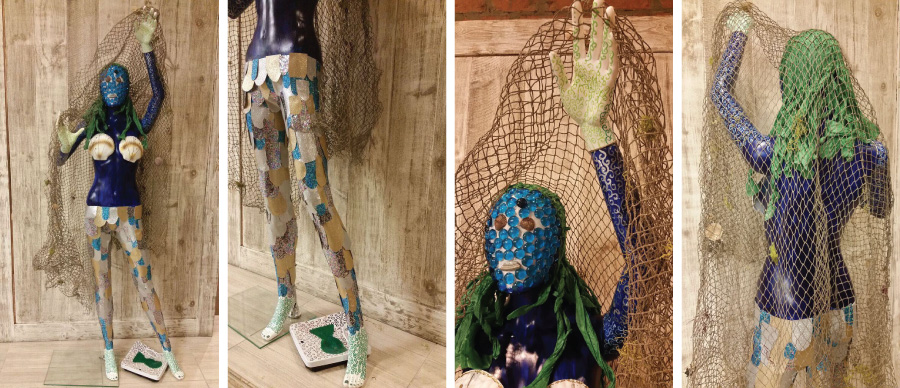
Artist: Veritas Collaborative – Durham, NC
Calypso was created during weekly art therapy groups on the Adolescent Partial Hospitalization Unit at Veritas Collaborative. Inspired by the quote “scales are for fish” group members researched and developed an aquatic theme.
Calypso’s story from Greek mythology of concealing and deceiving, diverting others from their goals, and hiding on an island resonated with their experience of isolation and deception within their eating disorders. Group members added a broken scale and a fishing net to represent feeling trapped by worry about weight, size, numbers, and body image. Calypso is casting off the net to reveal acceptance of her body and leaving the scales for the fish. Group members also found meaning through peer support and discussion about cultivating positive body image inspired by their work with Calypso.
Materials:
mannequin, paint markers, decorative paper, glass beads, tissue paper, glitter, acrylic paint, glue, foam shells, fishing net, shells, moss
Artist Profile:
Veritas Collaborative is a Specialty Hospital System for the Treatment of Eating Disorders. Accredited by The Joint Commission, Veritas delivers multidisciplinary, evidence-based care for patients and their families in a warm, inviting, and gender inclusive environment. Located in Durham, NC and Richmond, VA, Veritas Collaborative provides Inpatient, Acute Residential, Partial Hospitalization, and Intensive Outpatient levels of care for individuals with eating disorder diagnoses (ages 10+).
Would you judge me if I were a tree?

Artist: LaVentana Treatment Programs Encino – Encino, CA
What do you see when you look at a tree? Do you see strong roots anchoring it to the earth? Do you see boughs with leaves of different shapes, sizes, and colors? Do you see a living organism that is allowed to take up space? Do you consider that trees keep the air clean by removing and storing the toxic carbon while releasing oxygen back into the air? Wouldn’t you agree that trees, of all shapes and sizes, are majestic?
What would happen if we, as a society, looked at each other through the same lens that we use to consider a tree? Perhaps we would see perfectly imperfect people. Perhaps we could tolerate the diverse and different people we encounter, much the way we enjoy the unique offerings of each tree.
Unlike a tree, people often take in the toxicity of commentary on shape and size without the ability to release it. The overvaluation of shape and size has been detrimental to many, often playing a role in the development and recurrence of eating disorders.
Our theme encompasses a discourse on the overvaluation of shape and size as well as an important component of the La Ventana, Encino program: Existential Gardening. In this group the provision of meaningful activity within treatment is provided by gardening together. The cognitive, physical, and social therapeutic benefits of gardening, that promote mental health, are explored within the existential themes of personal responsibility, hope, and creating meaning in life. The growth of a seedling or plant is used as metaphor for a person’s own development and growth in recovery. Each client is responsible for nurturing a plant while in treatment. Clients work on individual and group projects. The intrinsic hope and imperfection in gardening has therapeutic potential. How would you judge someone if they were a tree?
Materials:
- Toilet rolls – painted green & gold, cut up and stuck together in the shape of flowers made up the head-dress were made by Leila Costa LMFT and all clients involved.
- To recycle something originally made from a tree and have something that was made from scratch as part of the décor.
- Hoop skirt was bought to enlarge the size in general of the mannequins clothing.
- Ball gown dress was bought from Goodwill thrift store and then cut up and deconstructed to fit over the hit with décor attached all over it.
- Fake Christmas tree leaves and branches were used and wrapped around the torso of the body to increase the size and give the impression of looking like a festive tree.
- The mannequin is leaning forward elevated to look like she’s almost about to fly.
- The canvas bag was painted by adolescent client and the arm of the mannequin both asked the controversial questions.
- Festive red lights were added so the mannequin would also still stand out in the dark.
- Clients also painted blank Christmas tree decorations and one asked the question: “What size do snowmen come in?”
Artist Profile:
Cymbeline Smith (Program Director) alongside Heather Hutchins (office coordinator) and Laura Westmoreland (MFT intern) created the concept about Size-ism difference between festive trees and human bodies. The Encino Program is known for its Existential Gardening Groups and so the theme of trees was in keeping with the site.
6 adult clients and 2 adolescent clients helped to make the concept a reality with the materials used below. The theme of body image challenges is recurring in eating disorder treatment and size-ism is a huge obstacle to overcome in recovery and our society still in general. Discussions around the difference in adjectives used happened while working creatively on the tree. For example; for trees accepted adjectives are ‘big’, ‘broad’ and ‘huge” but not so much for the human body. The staff above with Leila Costa LMFT and Danielle Bolduc (MFT intern) all worked alongside the clients to all be part of this inspiring mannequin.
Legends of the Phoenix

Artist: LaVentana Treatment Programs Santa Monica – Santa Monica, CA
Inspired by the legend of the Phoenix and the notion that through even the darkest of times, experience, strength and hope can be found. Our sculpture embodies the very essence of rising from the ashes in order to create new and beautiful beginnings. We believe that one must honor their shadows, to truly accept and embody the whole self. Through deep exploration and a willingness to walk through one’s unique journey, connection is discovered. The recovery process is deeply rooted in exploring one’s sense of self and creating experiences profoundly unfamiliar to a life once known. Breaking free from the chains of rigid thinking patterns and life scripts that no longer serve us, leads to a journey of honoring the authentic self.
Recovery is rooted in a willingness to lean into uncomfortable moments and experiences. The arms are covered with images that symbolize transformation and freedom. The papier mache’ body was created from torn papers and intentionally misplaced layering of the paper itself. The body represents honoring ones imperfections, while taming the harsh mental critic. Through welcoming the mind-body connection, we find a sense of equilibrium and authentic connection to self. Further, our theme speaks to the idea that there is often much more than what meets the eye. Recovery is about a willingness to reduce initial judgments and thoughts attached to ones self and others. This act creates clarity and an authentic opportunity for connection.
Luciano De Crescenzo once said, “We are each of us angels with only one wing, and we can only fly by embracing one another.” Our sculpture only has one wing to signify the wholeness we feel when we are safe, connected, and securely attached. We believe that we must stand together in connection and advocacy, paving the way for more angels to find their wings.
We dedicate our sculpture to the courageous men and women who exemplify this resilience, determination and strength during their journey towards living a meaningful life and embracing positive body image at La Ventana.
Materials:
Mannequin, ribbon, tulle, acrylic paint, aluminum foil, cardboard, coffee filters, food dye, papier maché, kraft paper
Artist Profile:
Megan Becker, M.A. completed her undergraduate work in musical theatre and costume design. Through her work in the creative arts, she discovered her passion for empowering others to discover an authentic connection to self and an acceptance of one’s body in any form. Megan guided our clients through this project with intention, inspiration and an unrelenting focus on embodying ones unique voice.
Reflections of a Man-Akin

Artist: LaVentana Treatment Program Kalinda – Thousand Oaks, CA
“Refection of a Man-Akin” is inspired by the concurrence of distorted body image and the work dedicated to achieve body acceptance. It is jagged and sharp yet smooth and melting away in the same breath. This [man-akin] is a collaboration of truths from clients in residential eating disorder treatment who have combined forces to share their body image struggle and begin to see from a new perspective – connectedness, hope, and love.
“I cannot see my own reflection. My perception has been shattered. I am merely human, in the midst of a collaboration of ethnicities, colors, races, materials, genders. I am forever changing and evolving and my effort here is to bridge the gap between my distortions and the truth about my body. I want to embrace myself.”
“The shattered mirrors represent my distorted perception of self and body. Others see beauty but I see brokenness. Despite my difficulty seeing the image reflected back to me, the mirrors also represent my resilience and ability to reflect negativity from others and begin creating my own perception of self. The dark melting of crayons represents the all-consuming darkness that lives in the eating disorder mind and projects itself onto the body, sticking to the body as if the body is the problem.”
“It melts from the head down. The colors in my head influence the colors in my body and vice versa. Each color represents an emotion. Most of our emotions start from our thoughts yet also impact our bodies physically, especially for those who hold emotions in. If I can connect with others and allow them to be my mirror, reflecting the truth, I know I will be okay.”
Materials:
Crayons melted with a hair dryer, broken glass, glue
Artist Profile:
This mannequin was created entirely by six clients in residential eating disorder treatment at La Ventana in Thousand Oaks, CA. Clients took this project head-on, worked as a team, struggled to communicate, yelled at one another, laughed with one another, and created this beautiful piece of art that all can say they are proud of.
The Hero’s Journey

Artist: LaVentana Treament Programs Santa Barbara/CA
Our mannequin was inspired by Joseph Campbell, an American mythologist’s, concept of the monomyth, or Hero’s Journey. The Hero’s Journey is the template found in movies, books, and stories told as far back as anyone can remember. However, the most fascinating thing about it is that it can be applied to everyday life, as lived out by “ordinary” people. We have taken the Hero’s Journey and applied it to the journey one embarks on when in recovery.
Our Hero’s Recovery Journey begins with the “call to adventure” in which our hero begins to contemplate recovery, but isn’t quite sure yet. However, with time and the help of a mentor (friends, family, treatment team), the hero crosses the “threshold” from a world of addiction to the unknown world of healing and discovery. This step parallels the difficult step of beginning treatment. Through this process, the hero faces many “challenges and temptations” as she explores the factors that contributed to her addiction. Eventually, over time, the hero experiences a death of her old self and a rebirth of her true self as sheds her life of addiction and returns to her life with greater wisdom, understanding, knowledge, and clarity.
Our manikin features dress and decorations that symbolize journey, rebirth, discovery, and intuition. The key she holds in her hand, the compasses and maps on her feet, arms, and face, and the shirt she wears all reflect her journey towards living an authentic life. The wings on her back, the butterflies on her arms, and the flowers throughout represent life and rebirth. The dove on her shoulder represents the wisdom and guidance that guide her. The burlap on her legs, crown on her head and ribbons on her body symbolize a life of adventure. Lastly, “to thine own self be true” on her face beckons the resounding truth that freedom resides in honoring ones true self.
Materials:
Burlap, Boa, Stickers, Bottle caps, Ribbon, Bicycle model, Metal key,T-shirts, String, Fabric flowers, Gold pens, Feather wings, Fabric butterflies, Nail polish, Hot glue, Rubber cement, Compasses, Map paper, Map stickers, Twig crown, Feather dove
Artist Profile:
The creators of this piece include a team of licensed, intern, and trainee therapists and a group of women receiving treatment for recovery from an eating disorder. All persons involved are on some phase of the “Hero’s Journey”, pursuing a life of recovery, meaning, and fulfillment. Participants are members of la Ventana Treatment Programs, Santa Barbara.
Kaleidoscope Divided
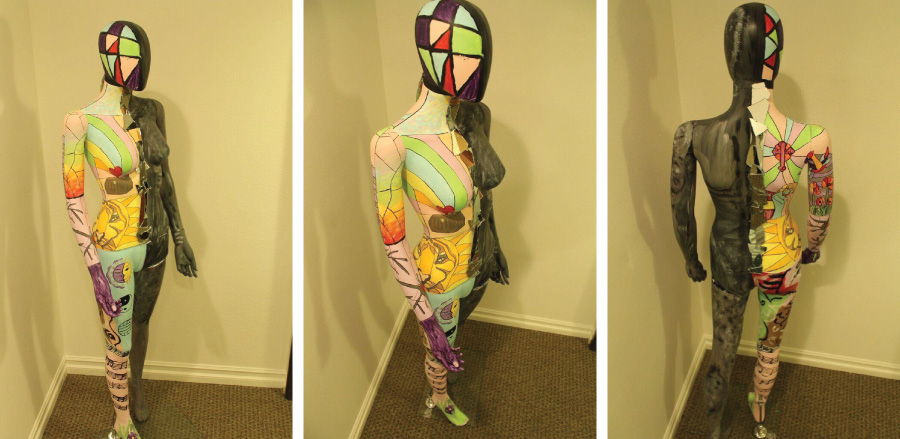
Artist: LaVentana Treament Program Westlake Village – Westlake Village, CA
Recovery is a multi-faceted process of discovering one’s true self. This mannequin displays the two choices every eating disorder client is faced with…the choice of remaining in their debilitating disease or the choice of embracing a beautiful life in recovery.
The darkness on one side represents what the life of an eating disordered client looks like. EDs come in all shapes and sizes and varieties. The aloneness, the hopelessness, the depression, the self-harm behaviors, the restricting, the bingeing, the purging, the overeating, the over-exercising, the isolating, the sickness, the tiredness, the weakness, the seemingly never ending thoughts of wanting to act out in behaviors…this side exemplifies everything that an eating disordered life leads to.
The colorful side of the mannequin represents the recovered life. In recovery there is love, joy, happiness, health, hope, companionship, security, emotional stability. The kaleidoscope of colors displays how beautiful the recovery process can be. All facets of this life come together like a stained glass window. Each painted section reflects something meaningful to our clients’ own recovery process, such as the flowers, the cross, the lion, the music score, the sun, the heart, the yin yang symbol, the volleyball. Even the abstract pieces hold meaning and are up for interpretation.
The broken shards of glass running down the mannequin divide the two sections. These represent the shattered misrepresentation of ourselves. Every ED client is faced with two choices in life. They can either choose to live in the dark hopeless place forever or they can choose to embrace a recovered life. Looking in the mirrors at the right angle, one can see a beautiful reflection. In recovery, all the broken pieces can be put back together.
The Kaleidoscope Divided represents our clients’ experience of disorder, treatment, and making it through to the other side. May all be inspired to live the recovered life.
Materials:
acrylic paint, permanent marker, hot glue, mirrors
Artist Profile:
The project was a collaborative effort of clients attending La Ventana Treatment Programs’ Eating Disorders Outpatient Program in Westlake Village, CA. The clients worked on this project under the guidance of a Marriage and Family Therapist Intern, as well as under the supervision of the Program Director of the site.
Balance Embodied
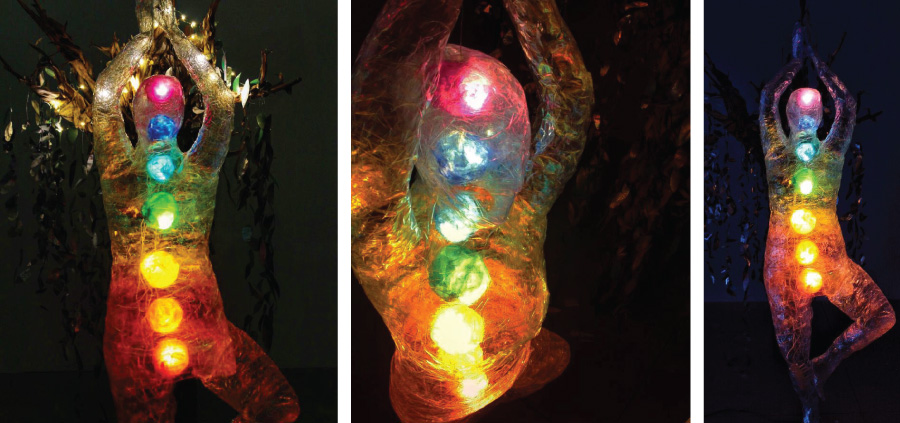
Artist: Rogers-Madison – Madison, WI
Recovery is a journey through shadows to reawaken and reconnect the body, mind, and spirit. As we walk alongside our clients we call upon the energy of therapist and client to build and create the space for genuine, open, relationships. When we meet the client with an open heart and mind we nurture their ability to be authentic. Together we learn to balance, hold, and share the energy that we use to heal. Recovery becomes a holistic journey through the shadows of the past from which we emerge able to dance with the darkness, to balance physical, emotional, and spiritual aspects of life, and ultimately to truly be within the body.
The sculpture is constructed of packing tape which was molded to the form of a woman on her own journey towards healing the connection with her body. The lit chakras represent her willingness to open and embrace the breadth of her lived experience even as she continues to struggle with the shadows of doubt and fear. Balanced in tree pose she stretches upwards while remaining solidly grounded and connected to the earth. She embodies the point of balance between polarities of past and future, earth and sky, roots and leaves, stillness and movement.
“Balance Embodied” seeks to answer a question that is whispered through tears so often in my work with clients: “what is it like to be in your body? To be okay with being in it? Is that even possible?” She stands as an affirmation to each man and woman who dares to take the journey and to reconnect to their own energy. Yes. It is possible. Yes. you can.
Materials:
Packing tape, tissue paper, LED lights, fishing line, glue, construction paper, spray paint, corn stalks and corn husks.
Artist Profile:
Laura Teoli, MS ATR LPC is a current doctoral student at Lesley University exploring therapeutic presence and art making in group art therapy. She currently works with clients struggling to rediscover their strength and resilience at Rogers Memorial Hospital’s Partial Hospitalization Program in Madison, WI. Her work with clients struggling with eating disorders focuses on holistic care, finding balance, and authentic relationships with the self and others.
Nothing into Something
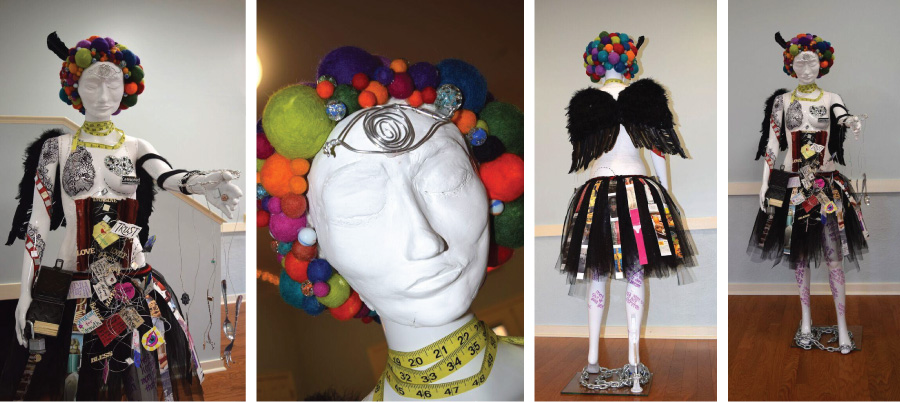
Artist: Fairhaven Treatment Center – Cordova, TN
Vulnerable, determined, creative and inspired, she yearns to break the mold of what women believe their bodies should be. She challenges the world to imagine her beyond what they see by outwardly displaying internal aspects of herself. Her internal parts describe what she is beyond her eating disorder, and goals that she possesses.
She stands tall and winged, holding the tools to conquer her eating disorder. Her face looks as though it has once experienced defeat, but is now expressive of mindful determination, with gently closed eyes, concentrating her energy into an opened third eye. Her colorful hair made of wool balls represents thoughts, none perfect or the same, but all treasured. Written across her bound torso are messages associated with overcoming negative body image, such as “suck it up” and “be pretty,” but emerging from her inner core are words, phrases and images that express internal hope. She is decorated with a sparkling heart filled with compassion, longing for love and attachment. She is marked with interwoven zentangles that symbolize her creativity, diversity and strength. She bears a red, mirrored stripe across her arm, representative of the emotional and physical hardships of self-harm. She holds an unlocked box of defenses that echo her inner core. In her outstretched arm she holds a mobile made of manipulated silverware, seeking eyes, and a Hamsa to help guard against the ills of eating disorders. Standing upon chains that once held her down, her legs are covered in inspirational messages that describe overcoming obstacles and promote recovery. She stands confidently and walks with caution because she knows she is valuable.
Materials:
The mannequin was constructed using cardboard, clay, fabric, feathers, ink, marbles, metal, paint, paper, plaster, plastic, wire, wood, and wool. Her production was a collective effort of creative visions, artistic talent and hard work.
Artist Profile:
The artists are clients of Fairhaven Treatment Center for Eating Disorders located in Cordova, Tennessee. Participants include Anne-Marie C., Ashley E., Caroline S., Cecily M., Heather G., Mary-Michael R., Nicole M., River D. and residents of Fairhaven Treatment Center. The mannequin was created under the guidance of Fairhaven art therapist, Elissa Mackie.
Anam Cara, Soul Friend (Rowan)

Artist: Inner Journey Group with Laura Riss, PsyD – Duluth, GA
Named Rowan in honor of the tree’s healing and protection, she takes her themes from John O’Donahue’s book Anam Cara. In Celtic tradition, your anam cara is your soul friend. Rowan’s symbolism lies in the power of friends to help us truly see ourselves. She stands upon a ring of paper dolls the same way those of us in our Inner Journey group depend on each other for the truth, a truth lit by a gentle light. With the support of our friends we have the strength to live our truth, without the distortions society often imposes: “the superficial and functional lies and half-truths of social acquaintance fall away, you can be as you really are.”1 O’Donahue celebrates the nature of the body: “Your mind can deceive you and put all kinds of barriers between you and your nature. Your body tells you … whether you are living from your soul or from the labyrinths of your negativity.”2 Rowan also celebrates the connectedness of our bodies to nature. Her skirt becomes a trunk at the bottom and her back is decorated with the tree of life. The paw print and the butterfly symbolize animals, our brothers and sisters. She holds a scale to symbolize our struggle for balance and a light for the gifts we bring to the world. We often find it difficult to recognize those gifts and to allow ourselves to be open enough to share them. The door in her chest allowing the light to escape stands for this opening of our hearts: “There is so much blessing and beauty near us that is destined for us, and yet it cannot enter our lives because we are not ready to receive it. The handle is on the inside of the door; only we can open it.”3
1 O’Donahue, John. Anam Cara: A Book of Celtic Wisdom. HarperCollins Publishers, New York. 1998. p. 14.
2 ibid, p. 48
3 ibid, p. 87
Artist Profile:
The women who worked on this project are part of Dr. Riss’ Inner Journey group for women with eating disorders. While the project evolved over several months, we have been part of her therapy groups in the past, so that some of us have known each other for several years. This history gave us a deeper understanding of each other and let us work intuitively and comfortably together on this project.
Do You See Me, Or A Reflection Of Who You Want Me To Be?
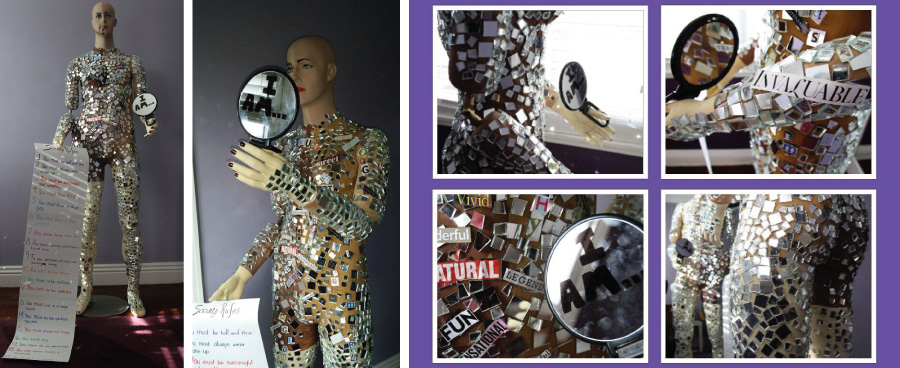
Artist: Shoreline Eating Disorders Treatment Center – Long Beach, CA
Eating disorders don’t discriminate. With our mannequin, we decided to use a variety of skin tones to represent that eating disorders affect people of all races and ethnicities. Half of our mannequin is painted in a typical female way, with paper mache creating the silhouette of a curvy female. The other half of the face and body are more masculine. Eating disorders have been historically thought to only afflict young, white females and we wanted our mannequin to dispel this stereotype. Our mannequin holds a scroll that signifies the rules and beliefs that we are taught in our society. The mannequin’s other hand holds a mirror, on which is written “I AM…” to signify our true characteristics without the eating disorders’ judgment. The body is covered in reflective mirror pieces to question whether others see us as who we are or a reflection of societal expectations. This question was sparked by discussion of our authentic selves versus external expectations that society imposes.
Materials:
paint, reflective mirror pieces, glue, magazines, sharpie pen
Artist Profile:
This mannequin was envisioned and created by clients at the Shoreline Center for Eating Disorder Treatment in Long Beach, CA. Shoreline offers PHP, IOP, and transitional living (Satori House).
Relieve me of the Bondage of Self
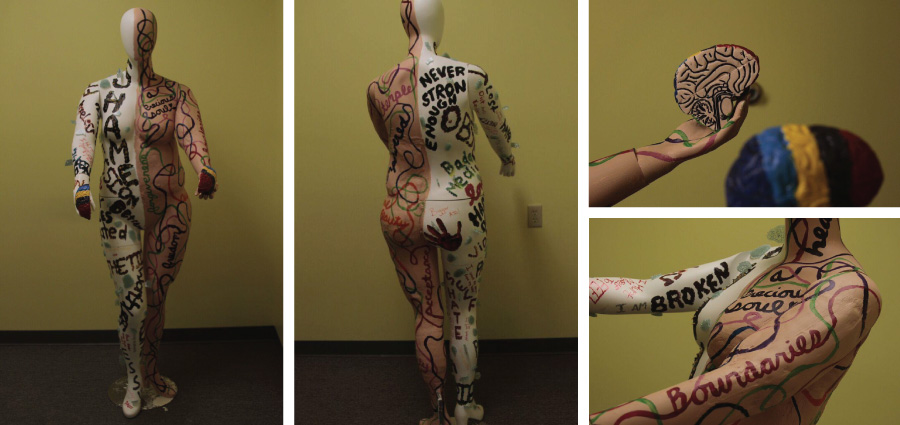
Artist: Willow Place for Women – Asheville, NC
I am dying to be freed. Freed from the bondage of self. I am so torn up, externally and internally, about who and what my body represents. I want to believe that being beautiful isn’t being skinny. I want to be free from the voice inside my head that screams that I will never be good enough. My brain is like a broken record playing the same tune about how much I hate myself. My legs are too thick, my butt isn’t round enough, my arms flap like wings from all of the extra fat. I want to come to a place of authenticity and acceptance. I want to love myself and be one with my body. My past still haunts me at times. However, it does not have to control me. The beliefs about myself and the self-hatred that I feel is a false reality and a false representation of the person I am deep down. I am beautiful and I am good enough. I can let my light shine and not be ashamed. I am brave and confident. I am alive and I have been given this second chance to truly live. It’s time to stop holding on to my old self and replace with the new. My heart and soul long to shine bright. I am ready and excited to see what’s next. I am free, my shackles have been broken. I am learning to love all that I am, my precious innocent soul.
Materials:
Mannequin, cotton batting, plaster gauze strips, glue, glue, auto glass, acrylic paint and permanent marker.
Artist Profile:
Willow Place for Women-NC is a dual diagnosis treatment center treating co-occurring substance abuse and eating disorders. The title of our art work is “Relieve me of the Bondage of Self,” which comes from the ‘Big Book’ of Alcoholics Anonymous. Our work reflects the importance of integrating treatment in recovery.
Coming Out of ED’S Closet
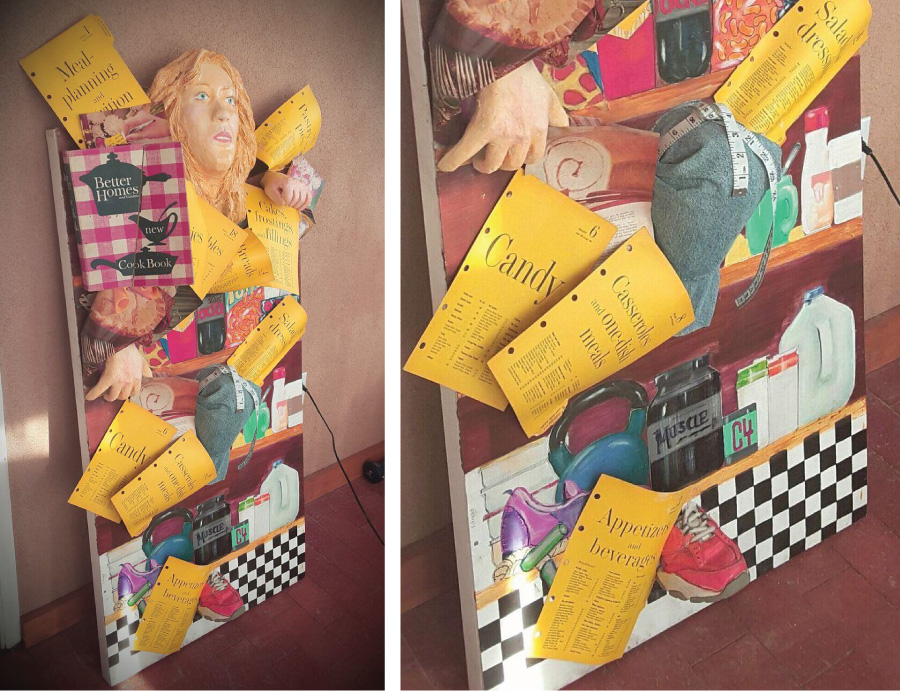
Artist: Eating Disorder Treatment Center (EDTC) – Albuquerque, NM
This is a sculpture of a woman emerging from Ed’s closet, she is pushing her fist through an explosion of pages from an iconic cookbook and sweets. Her head is above the chaos looking to the future, as her knee (wrapped with a tape measure) emerges from the middle of the closet. Her athletic shoe is poking out from the bottom of the closet, surrounded by a kettle bell, energy drinks and a scale.
This sculpture was created by a client and art therapist at EDTC in Albuquerque New Mexico. The idea was to create an original sculpture of an image of a woman pushing through the chaos in an environment that is totally immersed in ED. On the shelves inside Ed’s closet are junk foods, caffeine, energy drinks and time-worn recipes that have fueled generations of people with eating disorders We can clearly see the determination on the sculpted face of the young woman as she shoves her fisted left hand through the chaos, while her right hand pushes against the shelf of “junk” food in ED’s closet.
The creative team at Eating Disorders Treatment Center of Albuquerque, New Mexico created the ED “closet” filled with ED’s chaos of food, exercise paraphernalia and a multi-generation cookbook that was a staple in American kitchens for 3 generations.
The creative team at EDTC wanted this work to be original and filled with determination and “fun.”
Thank you for allowing us to be a part of the effort to inspire new generations to come out of ED’s closet!
Materials:
Cookbook pages, tape measure, Athletic shoe, kettle bell, energy drinks, scale
Artist Profile:
The creative team at Eating Disorders Treatment Center of Albuquerque, New Mexico.
There is no mass produced human
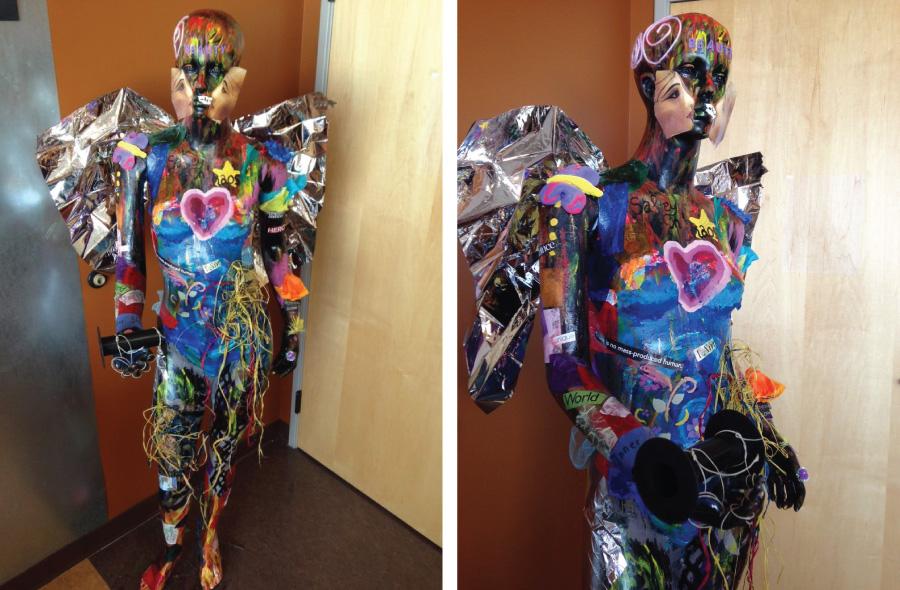
Artist: Eating Recovery Center – Denver, CO
“Let’s assume that each person has an equal opportunity not to become equal, but to become different to realize whatever unique potential of body, mind, spirit, he or she possesses.” — John Fischer
“To be yourself in a world that is constantly trying to make you something else is the biggest accomplishment.” — Ralph Waldo Emerson
This colorful mannequin was inspired by the quotes above. During the making of this mannequin, time and space were created in which to honor and celebrate the creativity and unique perspective of each participant. Each of these participants, who identified as a person who has experienced an eating disorder, spoke about the importance of embracing their differences and unique qualities throughout their treatment. Many Patients added various colors, shapes, images and words to the manikin’s form. With respect to each other’s contributions; Patients added details together to create a female form that is free of any particular style or identifying features.
Patients felt that the addition of the cellophane wings was necessary in order to depict the freedom one feels when embracing the unique qualities of themselves and the rejection of societal pressures. Patients also identified that this freedom helped carry them through rough patches of self-criticism and judgement.
The word ‘why’ was added to the form’s face to represent the questioning of how comparing serves us in our search to become closer to our values. Why not celebrate what makes you, you?
Materials:
modge podge, magazine cut outs, model magic, paint, sticker letters, cellophane, yarn, string
Artist Profile:
The art piece was created by men and women in the Inpatient Unit at Eating Recovery Center in Denver, CO. The art piece was created during weekly art therapy groups facilitated by Art Therapist Emerald Smith, MAAT, ATR, LPCC.





